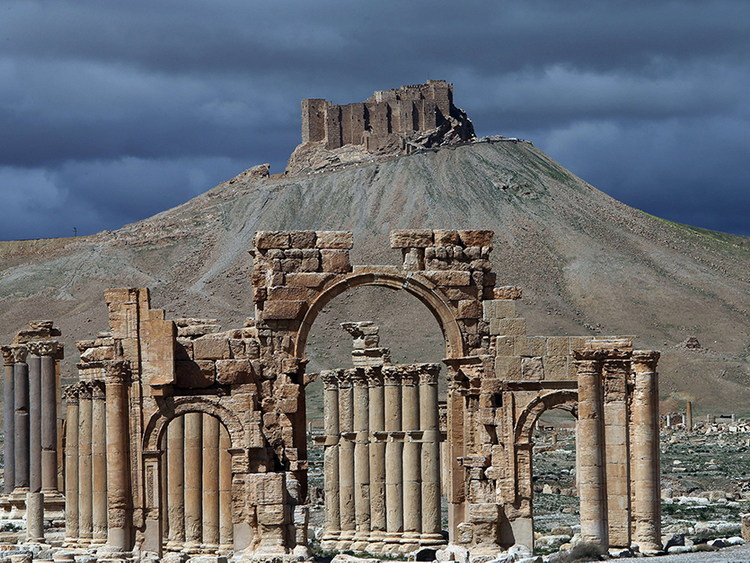Riga/Baghdad: French President Francois Hollande called for a new international push for a peace deal in Syria on Friday, saying the fall of Palmyra to Daesh showed President Bashar Al Assad was gravely weakened.
“Once again we call for the preparation of a new Geneva,” he said after an EU summit in Riga, referring to earlier conferences aimed at brokering a transition from Assad to Western-back rebels who have also lost ground to Daesh.
“With a regime that is clearly weakened, and with a Bashar Al Assad who cannot be the future of Syria, we must build a new Syria which can be rid, naturally, of the regime and Bashar Al Assad but also, above all, of the terrorists.
“We should do all we can so that a political solution can be worked on, prepared, in the coming weeks,” Hollande said, adding that Russia and the United States should be involved.
Asked if foreign military intervention was called for, he stressed that he was looking for a political solution.
Meanwhile, Daesh militants have seized another town in Iraq’s western Anbar province less than a week after capturing the provincial capital, a tribal leader said Friday, while in neighboring Syria the group’s fighters killed dozens of pro-government forces in the ancient town of Palmyra.
Daesh fighters combed Palmyra, detaining and killing dozens of people two days after seizing the town, which is home to one of the Middle East’s most famous archaeological sites, activists and officials said.
Homs-based activist Bebars Al Talawy and an opposition Facebook page said that as many as 280 soldiers and pro-government forces have been killed in Palmyra since it was captured Wednesday.
Al Talawy said militants abducted soldiers and pro-government gunmen from homes, shops and other places where they had gone to hide. He added that many were shot dead in the streets.
He said Daesh terrorists used loudspeakers warning residents against sheltering troops, leading many to come forward to give information about forces that had melted into the civilian population.
Maamoun Abdul Karim, the head of the Antiquities and Museum Department in the Syrian capital Damascus, said “there are arrests and liquidations in Palmyra.” He added that Daesh terrorists are “moving in residential areas, terrifying people and taking revenge.”
Abdul Karim said no gunmen were seen in the area of Palmyra’s 2,000-year-old ruins, which once attracted thousands of tourists.
The Britain-based Syrian Observatory for Human Rights said Daesh terrorists have killed 17 men in Palmyra and that it has unconfirmed reports of the killing of dozens more.
Gov. Talal Barazi of the central province of Homs, which includes Palmyra, said that Daesh terrorists have abducted men and “might have committed massacres.”
An amateur video posted on a pro-Daesh Facebook page showed people and militants gathering around two bloodied men in military uniforms in a Palmyra street. “Let all the residents see them,” one of the men in the gathering tells a Daesh fighter.
The video appeared genuine and corresponded to other AP reporting of the events.
The Observatory and Al Talawy said Daesh’s next target appears to be the Tayfour air base near Palmyra, where many of the Palmyra troops had retreated. They said Daesh is sending reinforcement to the air base area.
In Iraq, meanwhile, Sheikh Rafie Al Fahdawi said the small Iraqi town of Husseiba fell to Daesh overnight when police and tribal fighters withdrew after running out of ammunition.
“We have not received any assistance from the government. Our men fought to the last bullet and several of them were killed,” he told The Associated Press in a telephone interview.
Husseiba is about 7 kilometers (4 miles) east of Ramadi, where Daesh militants routed Iraqi forces last weekend in their most significant advance in nearly a year.
Al Fahdawi said that with the fall of Husseiba, the militants have come closer to the strategic Habbaniyah military base, which is still held by government forces.
“The situation is very critical. The militants are about 5 kilometers from Habbaniyah base, which is now in great danger,” he said.
A day earlier, Daesh militants captured the Iraqi side of a key border crossing with Syria after Iraqi government forces pulled out. The fall of the Al Walid crossing, also in Anbar, will help the militants to shuttle weaponry and reinforcements more easily across the Iraqi-Syrian border.
The Iraqi government plans to launch a counteroffensive in Anbar involving Iranian-backed Shiite militias, which have played a key role in pushing back Daesh elsewhere in the country. The presence of the militias could however fuel sectarian tensions in the Sunni province, where anger at the Shiite-led government runs deep.













